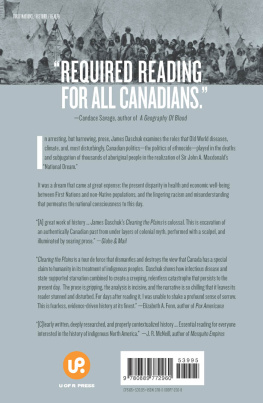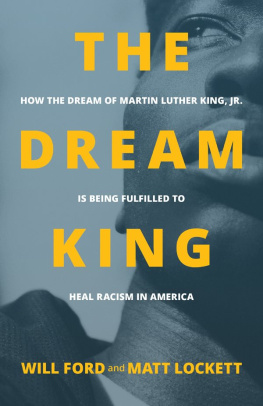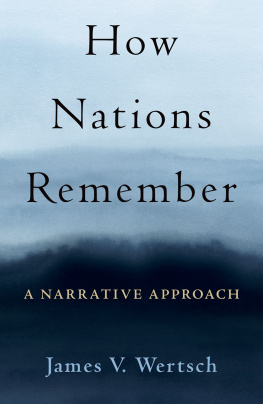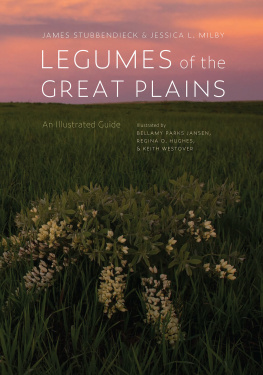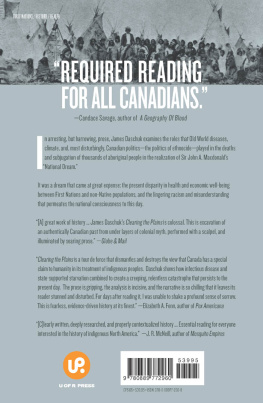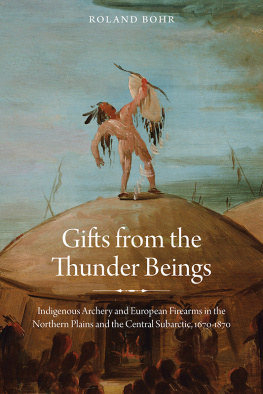

2013 University of Regina Press.
All rights reserved. No part of this work covered by the copyrights hereon may be reproduced or used in any form or by any meansgraphic, electronic, or mechanicalwithout the prior written permission of the publisher. Any request for photocopying, recording, taping or placement in information storage and retrieval systems of any sort shall be directed in writing to Access Copyright.
Printed and bound in Canada at Friesens.
The text of this book is printed on 100% post-consumer recycled paper with earth-friendly vegetable-based inks.
Cover and text design: Duncan Campbell, University of Regina Press.
Editor for the Press: David McLennan, University of Regina Press.
Copy editor: Dallas Harrison.
Index by Judy Dunlop.
Maps by Diane Perrick, University of Regina Press.
Cover photo: Cree Indian, Maple Creek, Saskatchewan, 1884. Reproduced with the permission of Natural Resources Canada 2012, courtesy of the Geological Survey of Canada (Photo 615 by T. C. Weston).
Library and Archives Canada Cataloguing in Publication
Daschuk, James W. (James William), 1961
Clearing the Plains [electronic resource] : disease, politics of starvation, and the loss of Aboriginal life / James Daschuk.
(Canadian Plains studies ; 65)
Includes bibliographical references and index.
Electronic monograph in PDF format.
Issued also in print format.
ISBN : 978-0-88977-246-5
Indians of North AmericaCanada, WesternHistory. 2. Indians of North AmericaDiseasesCanada, WesternHistory. 3. Indians of North AmericaHealth and hygieneCanada, WesternHistory. 4. Indians of North AmericaGovernment policyCanadaHistory. 5. Canada, WesternColonizationHealth aspectsHistory. 6. Canada, WesternEthnic relationsHistory. I. Title. II. Series: Canadian plains studies (Online) ; 65
E78.C2D36 2013 971.200497 C2013-901820-4
10 9 8 7 6 5 4 3 2
 | University of Regina Press, University of Regina
Regina, Saskatchewan, Canada, S4S 0A2
TEL: (306) 5854758 FAX: (306) 5854699
WEB: www.uofrpress.ca |
We acknowledge the financial support of the Government of Canada through the Canada Book Fund for our publishing activities, and the Creative Industry Growth and Sustainability program which is made possible through funding provided to the Saskatchewan Arts Board by the Government of Saskatchewan through the Ministry of Parks, Culture and Sport.

CONTENTS
T HIS PROJECT BEGAN AS MY DOCTORAL DISSERTATION AT THE University of Manitoba two decades ago, and I am indebted to many people and institutions that have helped me over the years. Dr. Mary Black Rogers opened up her home and the vast anthropological collection of her husband, Dr. E. S. Rogers, to me as a young graduate student. Dr. Jack Bumsted set me on the path by finding me work as a research assistant to Dr. Kue Young, then of the Faculty of Medicine at U of M. The Social Sciences and Humanities Research Council of Canada provided me with a doctoral fellowship as I began this study. Many friends and colleagues, particularly Dr. Rene Fossett and Scott MacNeil, kept me going during the years when this study took shape. Joy Flynn and Grant Taylor were kind enough to provide their cabin on the White Bear First Nation, where much of the dissertation was written. As I completed my dissertation, my graduate school friend and colleague, Dr. Paul Hackett, hired me as a research associate in the Faculty of Medicine at U of M, allowing me to spend almost two years immersed in the fascinating records of the Hudsons Bay Company Archives.
The second phase of this project was completed during my years with the Saskatchewan Indian Federated College (now First Nations University of Canada) and the University of Regina. Dr. David Reed Miller, Professor Emeritus at FNUV, was instrumental in the completion of this task. His encyclopedic knowledge, his collegiality, and his kindness have served to guide me in countless ways over the years. I am lucky to know him. I am very grateful to Dr. Greg Marchildon, Canada Research Chair in Public Policy and Economic History at the Johnson-Shoyama Graduate School of Public Policy, for providing me with the opportunity to spend an entire year studying the history of climate change and its impact on the indigenous communities of the region. I also thank Greg for suggesting the Canadian Plains Research Center Press (now the University of Regina Press) as a publisher for this project.
Dr. Ralph Nilson, former Director of the Indigenous Peoples Health Research Centre in Regina, gave me a home on campus as the manuscript took shape. I would also like to thank Dr. Craig Chamberlin, Dean of the Faculty of Kinesiology and Health Studies at U of R, and Dr. Bonnie Jeffery, Director of the Saskatchewan Population Health Evaluation and Research Unit (SPHERU), for their generous support in the editing of the final manuscript and Dallas Harrison for pruning it down to a manageable size. Thanks also to Brian Mlazgar (now retired) at the Canadian Plains Research Center for his patience in the completion of this project.
I would not have been able to undertake this study without the help of the staff of many libraries and archives, including Library and Archives Canada, the Hudsons Bay Company Archives, the Saskatchewan Archives Board, the Glenbow Archives, the Dr. John Archer Library at the University of Regina, and the late Ken Aitkin and his staff at the Prairie History Room of the Regina Public Library. My friends at First Nations University Library, especially Belle Young and Rob Nestor, made numerous trips there as enjoyable and they were productive. My friends and colleagues at the Network in Canadian History of Environment (NiCHE) have contributed to the work in a number of ways. I also thank my friend Doran Degenstein, the Executive Director of the Fort Whoop-Up National Historic Site in Lethbridge for his sage advice on many occasions.
Additionally, I would like to acknowledge the University of Reginas Humanities Research Institute for funding support, and Christina Winter, Copyright Officer with the Dr. John Archer Library at the University of Regina, for her help with securing permissions to reproduce some of the images that appear in this text.
Finally, and most importantly, I would like to thank my spouse, Giselle Marcotte, and my daughters, Dominique, Sophie, and Marie-Eve, for their support and patience over the many years that it took to complete this project. I dedicate this book to them.
F OR DECADES, CANADIANS HAVE ENJOYED AN ANNUAL ACKNOWLEDGEMENT of their collective success. Canada consistently places among the top nations in the world according to the UN Human Development Index. In its report for 200708, only Iceland, Norway, and Australia ranked higher than Canada in the criteria considered by the United Nations.First Nations people has been the primary factor impeding improved health outcomes for all of its citizens.
Racism among policy makers and members of mainstream society was the key factor in creating the gap in health outcomes as well as maintaining a double standard for acceptable living conditions for the majority of the population and the indigenous minority. In recent years, two important studies have investigated the role of racist attitudes of the dominant society as a cause of declining health conditions of indigenous people in western Canada. In
Next page
